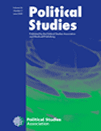This study contributes to our understanding of government repression in response to internal threats using a quantitative approach. In contrast to previous research, it focuses on the outbreak of state terror and on how different types of domestic dissent influence the risk of such severe state-sponsored violence. The empirical analysis distinguishes between demonstrations, strikes, riots, guerrilla attacks and revolutions, which vary in the level of violence and in the level of organisation that is behind the dissent, and analyses how those forms of threat affect the probability of repression onset. The empirical model controls for a potentially non-linear relationship between level of democracy and repression and investigates how dissent influences state terror in different political regimes. The analysis employs a logit model to test the link between dissent and repression in 149 countries between 1977 and 2002. The findings suggest that only guerrilla warfare increases the probability of repression onset. Democratic political regimes not only decrease the risk of state terror per se, but also dampen the effect of large-scale violent dissent on the risk of repression. The results also show that the longer a country manages to avoid repression, the less likely it is to suffer from repression again.
Carey, Sabine C. (2010) The Use of Repression as Response to Domestic Dissent, Political Studies 58 (1): 167–186.







